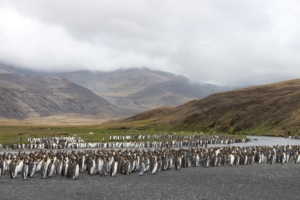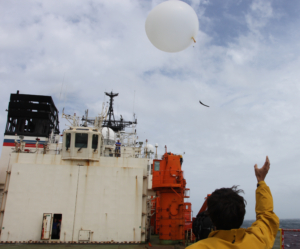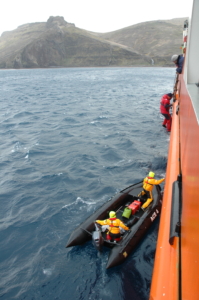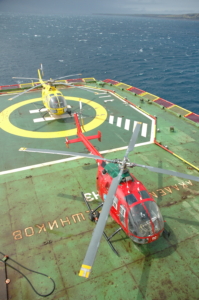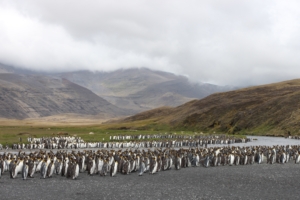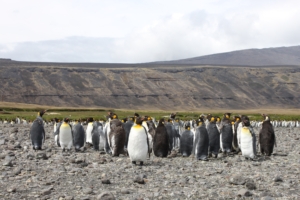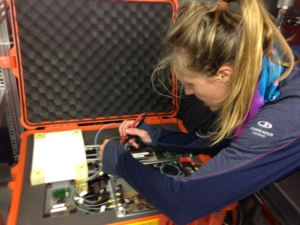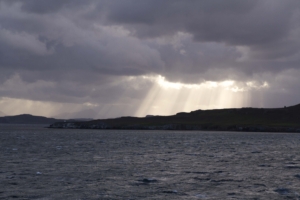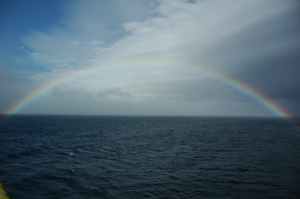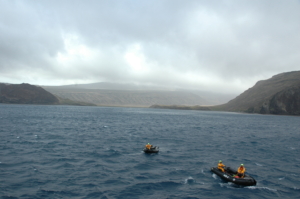A day in the life of a researcher on the Antarctic Circumpolar Expedition
05/04/2017
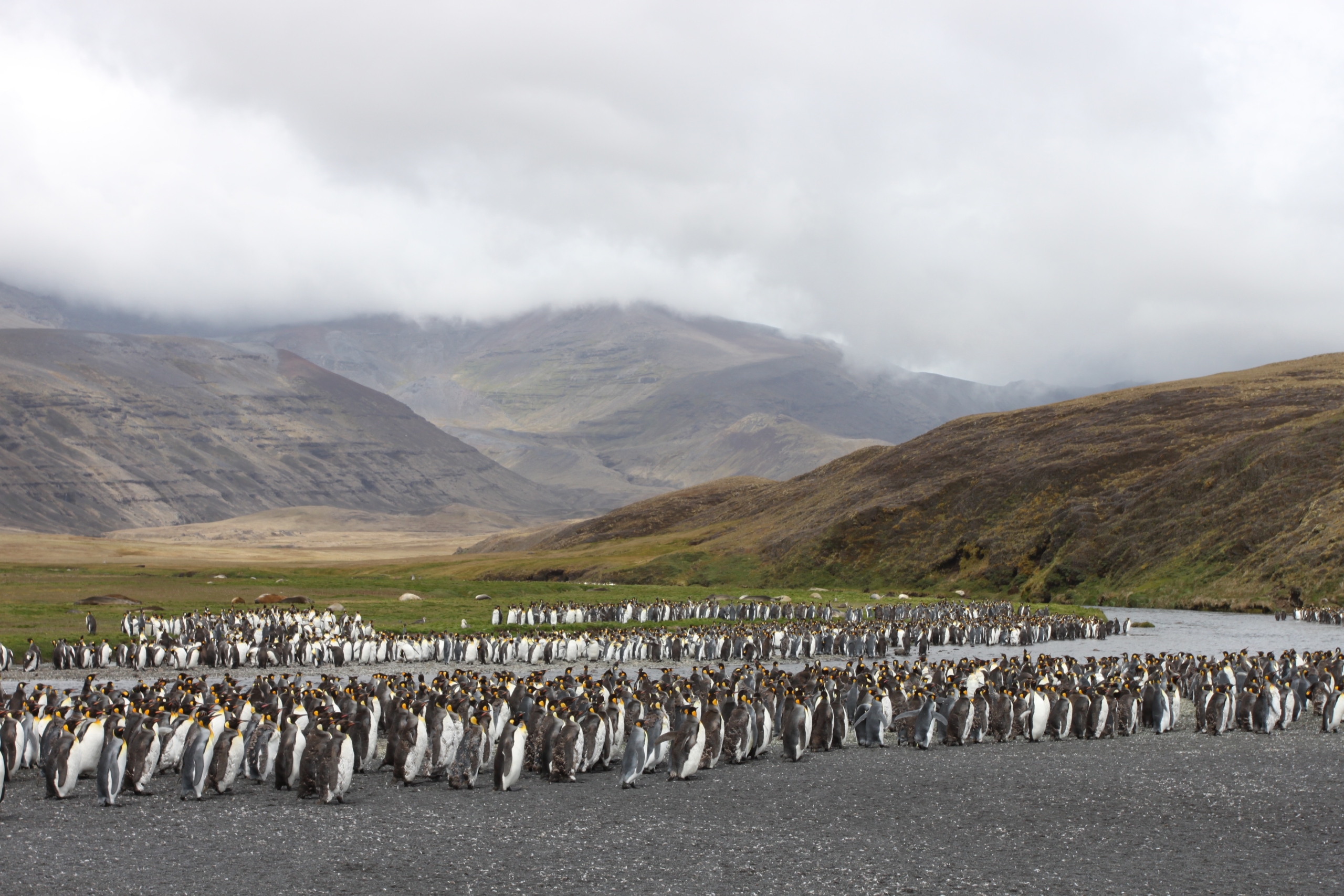
After the first few days on board the Akademik Treshnikov (a research vessel that has just completed it’s circumnavigation of the Antarctic Continent), and once the maze of stairwells and heavy doors have been explored, one finds a new rhythm of life. A rhythm uninterrupted by emails, internet, or phone calls, where there is time to get to know the more than 50 fellow scientists on the first leg of the Antarctic Circumpolar Expedition.
The morning of 31 December and there is excitement abounding – we have arrived at a remote group of French islands we are to stop over at, the Crozet Islands. The view from our cabin porthole is of icy sparkling blue waters and steep volcanic slopes. Those lucky enough to have land-based science projects are supposed to use the helicopters, but the gossip that flies around the ship (like wild fire when you find yourself without messaging apps!) is that it’s too windy to fly – those to go onshore are to wait. An hour passes, more news and it seems it’s possible to take the dinghies. Just a few minutes later and supposedly the helicopters will fly. There is chaos on board with some teams in survival suits all ready to jump into the dinghies and others ready to take off with the helicopters. In the end it all worked out and everyone who needed to get to the island managed to find a way there (and back!)
While some of the teams are on the island collecting samples (and saying hello to the penguins too!), the rest of us remain on board. This morning I’ve got plenty to do – some data analysis as well as some tests on the instrument I’m looking after, the iDIRAC developed at Cambridge and Cranfield University. So far the instrument has been running well, measuring isoprene, which we think is emitted by the phytoplankton blooms that abound in the Southern Ocean. These measurements are part of one of the 22 projects on board – projects that span disciplines from ornithology to chemical oceanography. Our project is trying to understand how aerosols form and interact with clouds in the clean Antarctic atmosphere. We hope our results will help us understand what the pre-industrial atmosphere looked like, and to provide a baseline from which we can better estimate the anthropogenic influence on climate.
A busy day was had by all and there are many relieved scientists happy to have made it back on board after some hair-raising helicopter flights back. There is also another reason to celebrate – New Year’s Eve – and the kitchen crew put together a spectacular buffet dinner that was served with some French champagne specially brought for the occasion. And yes, a little later there was even some dancing! Certainly a spectacular way to bring in the New Year, one with plenty more adventures that were had before we arrived in Hobart, Tasmania, and the end of the first leg of the Antarctic Circumpolar Expedition.
- Maria Lund Paulsen
- Maria Lund Paulsen
- Fiona Tummon
- Fiona Tummon
- Maria Lund Paulsen
- Maria Lund Paulsen
- Fiona Tummon
- Florian Brucker, Parafilms/EPFL
- Fiona Tummon
- Fiona Tummon
Further reading
Learn more about the technology here: https://www.cranfield.ac.uk/research-projects/ace
Find the official ACE blog: http://spi-ace-expedition.ch/
More information about the ACE-SPACE project can be found here: www.psi.ch/lac/ace-space
Categories & Tags:
Leave a comment on this post:
You might also like…
Introducing… Bloomberg Trade Flows
Are you interested in world trade flows? Would it be useful to know which nations are your country's major trading partners? If so, the Bloomberg terminal has a rather nifty function where you can view ...
Cranfield alumni voyage to the International Space Station
Seeing our alumni reach the International Space Station (ISS) has a ripple effect that extends far beyond the space sector. For school students questioning whether science is “for them”, for undergraduates weighing their next ...
From classroom to cockpit: What’s next after Cranfield
The Air Transport Management MSc isn’t just about learning theory — it’s about preparing for a career in the aviation industry. Adit shares his dream job, insights from classmates, and advice for prospective students. ...
Setting up a shared group folder in a reference manager
Many of our students are now busy working on their group projects. One easy way to share references amongst a group is to set up group folders in a reference manager like Mendeley or Zotero. ...
Company codes – CUSIP, SEDOL, ISIN…. What do they mean and how can you use them in our Library resources?
As you use our many finance resources, you will probably notice unique company identifiers which may be codes or symbols. It is worth spending some time getting to know what these are and which resources ...
Supporting careers in defence through specialist education
As a materials engineer by background, I have always been drawn to fields where technical expertise directly shapes real‑world outcomes. Few sectors exemplify this better than defence. Engineering careers in defence sit at the ...

